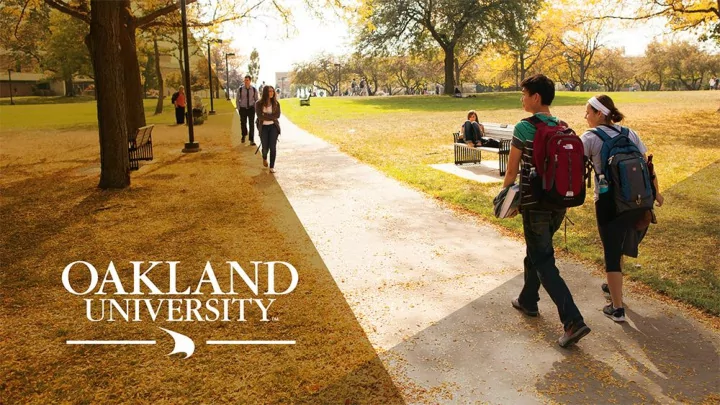

Disability Support Services & Mental Health Workshop Nancy Schmitz, Assistant Vice President of Student Affairs and Dean of Students Sarah Guadalupe, Director of Disability Support Services February 28, 2018
Disability Support Services Overview • DSS supports and advocates for students with a disability • Upon determination of a disability, provide reasonable accommodations for students to gain access to the curriculum and activities available on campus • Accommodations cannot fundamentally alter the core components of a course • Assist students in addressing personal and academic concerns • Provider referrals to other University support services, when necessary
Disability Support Services Fall 2017 Statistics • 661 students were registered with DSS during the Fall 2017 semester • The average GPA for registered DSS students was 2.99
Fall 2017 Breakdown by Disability Type of Disability Number of Students Psychological (Depression, Anxiety, PTSD, Psychosis) 172 ADHD 98 Autism 62 Learning Disability (Math, Reading, Writing, 132 Comprehension, Cognitive Impairment) Vision Impairment 13 Hearing Impairment 18 Mobility Impairment 10 Medical Diagnosis 156
Trends in Type of Disability • There has been an increase in the number of students with emotional and behavioral concerns • Psychological Disabilities have increased by 23% in the past year (2017, N=172) • Autism Spectrum Disorder Disabilities have increased by 22% in the past year (2017, N=62) • These include only students that have registered with DSS • We know there are many more students with this type of disability that does not register with our office
Request for Accommodations • Student contacts DSS office to schedule an intake appointment • During intake appointment medical documentation is reviewed • DSS staff develop reasonable accommodations that will provide access to the curriculum and activities on campus • The student will be provided a Faculty Notification Letter (FNL) • The student is responsible for providing the FNL to each of their faculty members • The FNL is effective from the date on the top of the letter or the date in which they provide the letter to the faculty member • FNL’s are not retroactive
Sample FNL CONFIDENTIAL: FACULTY NOTIFICATION LETTER Issued February 12, 2018 for Winter 2018 From: Sarah S. Guadalupe, EdS, LMSW Director, Disability Support Services saguadal@oakland.edu RE: Doe, J #1234 Pursuant to the Federal Rehabilitation Act, Oakland University will make reasonable modifications to its academic requirements as are necessary to ensure that such requirements do not discriminate or have the effect of discriminating, on the basis of disability, against a qualified disabled applicant or student; provided however, that no modifications will be made to requirements essential to the instruction being pursued by such student or to any directly related licensing requirements. Reasonable modifications may include changes in the length of time permitted for the completion of degree requirements, substitution of specific courses required for completion of degree requirements, and adaptation of the manner in which specific courses are conducted. Similarly, pursuant to the Federal Americans with Disabilities Act, Oakland University will make reasonable modifications in policies, practices, or procedures when the modifications are necessary to avoid discrimination on the basis of disability; provided however, no modifications will be made that will fundamentally alter the nature of the service, program, or activity. The student has provided documentation to the Disability Support Services (DSS) Office of a disability and is eligible for the following accommodations: Extended Testing Time (1 ½) on quizzes and exams. Professor will provide the accommodation for the student whose only need on exams is extended time. Your assistance with this student is greatly appreciated. Please contact the DSS office with any questions and/or concerns at 248-370-3266, saguadal@oakland.edu, loriszarama@oakland.edu or gough@oakland.edu SAMPLE
Total Number of Accommodations • 486 students received testing accommodations • 186 students received non-testing accommodations • Ex: housing, dietary
Responsibility of Faculty Regarding Accommodations • Provide extended time — time and a half accommodations for students • Provide a conducive testing environment for students • Contact Department Chair, Assistant or Associate Dean for any issues related to difficulty with providing accommodations • Contact DSS with any questions regarding accommodations
Time and a Half Accommodations • 226 students receive extended testing time — 1 ½ time • The student’s professor provides this accommodation
Additional Testing Accommodations 260 students receive the following testing accommodations that are arranged and provided through the DSS office • Extended testing time — 1 ½ time AND reduced distraction environment • 129 students receive this accommodation • Extended testing time — Double time • 38 students receive this accommodation • Extended testing time — Double time AND a reader and/or scribe • 57 students receive this accommodation • Other accommodations (reduced distraction environment, assistive technology, etc.) • 36 students receive this accommodation • 575 tests/exams/quizzes were administered by DSS during the Fall 2017 semester
Mental Health & Disruptive Behavior • Psychological Issues • Disruptive Behaviors • Assistance for Students and Faculty
Mental Health & Disruptive Behavior Psychological problems that may present as disruptive behaviors • Anxiety • Attention deficit/hyperactivity disorder • Autism spectrum disorder • Bipolar affective disorder • Depression • Personality disorders • Schizophrenia • Drug or alcohol abuse/dependence
Strategies in Addressing Disruptive Behavior Examples of disruptive behaviors and strategies to address them: • Dominating discussion • Loud comments challenging the faculty’s presentation • Inappropriate/excessive emails • Emotional outbursts in class
Assistance Ways We Can Assist • Faculty consultation with DOS office • DOS meeting with the student • Referral to Counseling • Referral to DSS • Medical Withdrawal • Involve Family • Conduct Referral • Interim Measures: PNG or Interim Suspension • Welfare Checks in conjunction with police
Reporting Resources & Contact Information • Dean of Students Office • 120 Vandenberg Hall • 248-370-3352 • Counseling Center • Graham Health Center • 248-370-3465 • Disability Support Services (DSS) • North Foundation Hall, Room 103A • Monday through Friday 8am-5pm • 248-370-3266 • General Email: dss@Oakland.edu • Exam Email: dssexams@Oakland.edu • Report and Support • https://www.oakland.edu/deanofstudents/behaviorconcern • Campus Police • 248-370-3331
Questions?
Recommend
More recommend